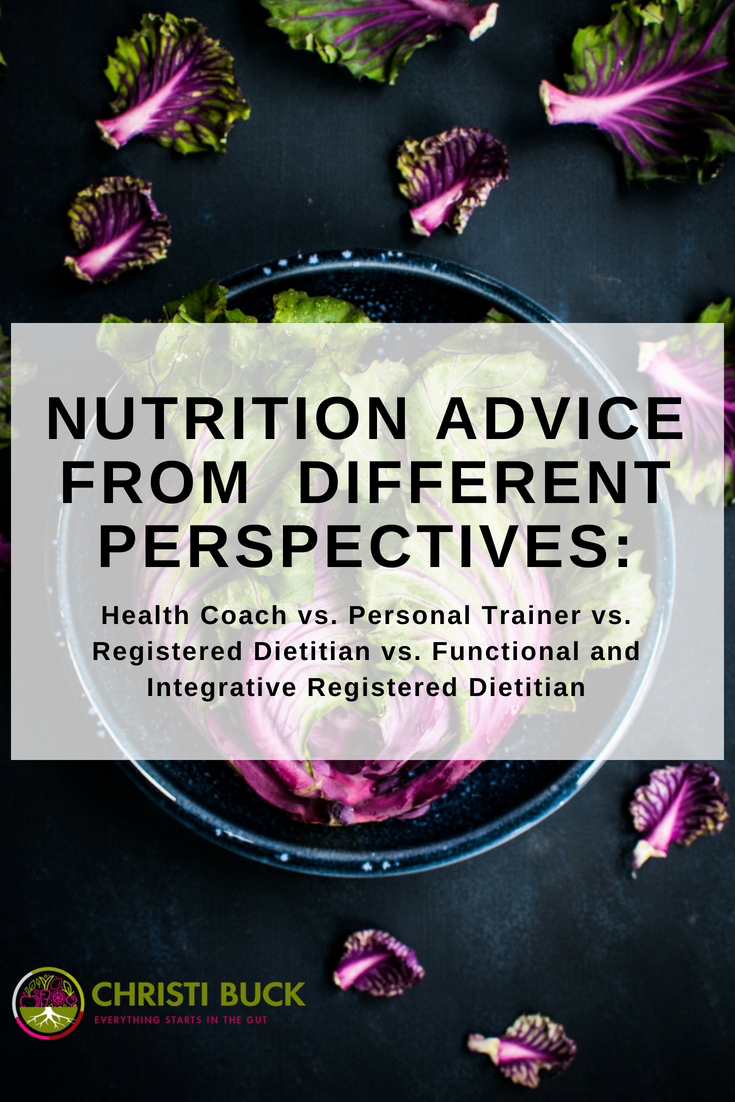You’re likely a little overwhelmed by who to turn to for nutrition education because everywhere you look, there’s a different type of health professional giving you conflicting advice left and right!
Registered dietitians are qualified to give medical nutrition therapy (MNT) and can treat medical conditions via a personalized diet. Unless you are a registered dietitian or a doctor, legally you can’t: diagnose medical conditions, prescribe diets or supplements to treat medical conditions, or prescribe diets to treat symptoms of medical conditions.
The bottom line? If you’re getting your nutrition advice from a health coach or a personal trainer and they are prescribing you a personalized diet to help you treat or manage your disease (obesity, diabetes, etc.), then that is outside of their scope and is considered illegal. Health coaches and personal trainers can talk to otherwise healthy clients about generally how to eat, move, and live better without crossing over into MNT.
Health Coach
You might be wondering… what the heck is a health coach? It sounds kind of broad, right? That’s because it is! A health coach focuses on general lifestyle changes and wellness by working with clients to help them reach their health goals and find better balance in all areas of their life.
When it comes to nutrition, health coaches can only provide their clients with nonspecific, basic nutrition advice, but they cannot prescribe specific diets to people. It’s also important to note that a health coach isn’t a regulated title with criteria specified by a governing body, in other words, they are not registered or licensed with the state.
Personal Trainer
You’ve probably noticed personal trainers working with clients around your gym. If you’ve never worked with one and you’re curious about what exactly a personal trainer does, they instruct and help people reach their personal health and fitness goals. Personal trainers also have the skills and abilities necessary to design safe and effective fitness programs. Basically, they instruct and assist people in reaching personal health and fitness goals.
But can personal trainers give nutrition advice? Personal trainers can only give nutrition advice the way that health coaches can: they can provide their clients with nonspecific, basic nutrition advice, but they cannot prescribe specific diets to people.
Registered Dietitian
Registered dietitians are are medical professionals who often take a more clinical approach to nutrition. RDs tend to work in hospital, private practice, sports teams, food companies or other clinical settings. Becoming a dietitian is a long process! RDs have to complete a minimum of a bachelor’s degree, complete an ACEND-accredited supervised practice program, pass a national board exam, and complete continuing professional education requirements to maintain registration.
In short, being a Registered Dietitian is the gold standard for nutrition professionals. Registered dietitians are qualified to give medical nutrition therapy (MNT) and can treat medical conditions via a personalized diet. Registered dietitians can specialize in a variety of different subfields of nutrition, which brings us to our next type of nutrition professional: a functional and integrative registered dietitian.
Functional and Integrative Registered Dietitian
Not all Registered Dietitians are created equal! There are registered dietitians, like myself, that specialize in functional and integrative nutrition. Functional and Integrative RDs really step back and look at the whole picture.
Let’s start with a few definitions from the Academy of Nutrition and Dietetics Dietetic Practice Group: Dietitians in Integrative and Functional Medicine.
- Integrative Medicine is the practice of medicine that reaffirms the importance of the relationship between practitioner and patient, focuses on the whole person, is informed by evidence, and makes use of all appropriate therapeutic approaches, healthcare professionals, and disciplines to achieve optimal health and healing.
- Functional Medicine addresses the underlying causes of disease using a systems-oriented approach and engaging both patient and practitioner in a therapeutic partnership. Functional medicine involves understanding the origins, prevention, and treatment of complex, chronic disease.
The five key areas of Integrative & Functional Medical Nutrition Therapy are: lifestyle, systems (signs and symptoms), core imbalances, metabolic pathways, and biomarkers.
- Lifestyle includes things like: food, culture, environment, movement, nature, relationships, sleep, stress, spirituality, sunlight, supplements, traditions, etc.
- Systems, Signs, and Symptoms looks at what is essentially a nutrition physical: circulatory, digestive, endocrine, immune, integumentary, lymph, musculoskeletal, nervous, reproductive, respiratory, skeletal, and urinary systems.
- Core Imbalances include things like cellular integrity, digestion, detoxification, energy metabolism, inflammation/oxidative stress, neuro-endocrine-immune, and nutritional status
- Metabolic pathways and networks include: anabolic/catabolic, nutrient cofactors, cellular respiration, eicosanoid series, biotransformation, steroidogenic pathway, and urea cycle
- Biomarkers include anthropometrics, digestion and absorption, genomics/SNPs, immune/inflammatory, metabolic energy, macronutrients, micronutrients, organic acids, toxins, etc.
The Takeaway
If you’re looking for nutrition advice that takes the whole picture into account, then a functional and integrative RD is the way to go! A functional and integrative RD has the unique ability to step back and look at everything from lifestyle to biomarkers to help you live your best life.


